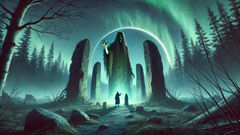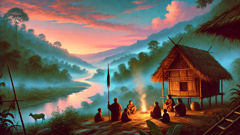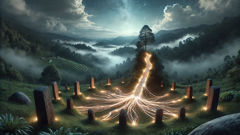Introduction
Beneath the endless sky of ancient Finland, the world was wild and untamed—a patchwork of dense, mossy forests, silent lakes, and brooding hills that seemed to brood with secrets. Here, the land breathed with old magic. Silver mists curled among the birches at dawn, and the wind carried the whispers of things unseen. The villagers who dwelled on the edges of this green wilderness knew that it was a realm where every stone, every ripple in the water, and every shadow beneath the pines could hold a story. They told tales in low voices by firelight, stories passed from mother to daughter, father to son, about beings that lurked just out of sight: the Hiisi. To outsiders, a Hiisi was a spirit or a giant, a shadow stretching across the land—sometimes trickster, sometimes terror. In Finland’s north, children were taught not to wander too far at dusk, lest the Hiisi lure them into the endless woods or across treacherous bogs. Some said the Hiisi carved the hills themselves with their massive hands, shaping the earth in fits of ancient anger or mischief. Others believed they watched from the dark heart of the forest, their eyes shining with a cold, otherworldly light, guarding hidden places and punishing those who disturbed the quiet sanctity of the wild. The old folk warned that the Hiisi were not mere stories, but the restless echoes of the land’s own will. There was a time, before the world was mapped and measured, when these spirits and giants walked openly among mortals. It was an age of raw wonder and fear, when humans and Hiisi negotiated a delicate truce: respect for respect, boundary for boundary. At the edge of such a forest, in a village cradled by hills and silvered by lake mist, begins our legend—a tale of a boy named Aapo, his courage, and the ancient pact between humankind and the wild spirits that watched from the shadows.
Whispers in the Woods
Aapo had always been drawn to the wild places that circled his village. From his earliest memories, the forest’s call was irresistible—an invitation woven of birdsong, pine-scented air, and the cool touch of moss beneath his feet. His father, Eero, often joked that Aapo’s heart beat in time with the ancient trees. Still, Eero’s face grew solemn whenever dusk painted long shadows between the trunks.

"Remember, boy," Eero would say, pausing at the edge of the woods with his hunting spear resting on his shoulder, "the forest is not empty. Show respect, tread softly. The Hiisi do not take kindly to arrogance."
For years, Aapo listened and obeyed. Yet as he grew into his teenage years, curiosity began to outweigh caution. The legends fascinated him: some described the Hiisi as enormous, stone-skinned giants who hurled boulders and shaped valleys. Others whispered of clever spirits—shadowy figures who led travelers astray or guarded ancient treasures. On winter nights, when the aurora shimmered green and violet across the sky, old Aunt Lempi spun tales of vanished paths, sudden storms, and eyes that glowed from deep in the woods.
One autumn, after the first frost had glazed the meadows, Aapo’s village faced hard times. The herds grew thin, and wild game became scarce. One morning, Eero returned from hunting empty-handed, his face etched with worry. The village council met in low, anxious voices. It was said the Hiisi were angered—that someone had trespassed in a sacred grove or fished from a forbidden pool. Superstition and fear tangled like brambles.
Aapo, desperate to help his family and prove himself, decided to venture deeper into the forest than ever before. He rose before dawn, his breath frosting in the cold air, and slipped away with nothing but his bow, a skin of water, and a sliver of bread. The forest greeted him in silence; even the birds seemed to be holding their breath.
As he walked, the trees grew older and thicker, their trunks twisted by centuries of wind. Sunlight faded, replaced by a luminous green gloom. Aapo felt the weight of unseen eyes. The legends returned to him in pieces—giants who could crush a man with a careless step; spirits who resented intrusion. Yet something else stirred: a sense of awe, a feeling that the land itself was alive and aware.
Midday found him beside a tumbling stream, its water so clear he could see every pebble on the bottom. He knelt to drink and caught sight of a strange stone, perfectly round and marked with ancient runes. He reached for it, but a sudden chill stopped him. A shiver ran up his spine as the shadows thickened. Aapo realized he was not alone.
A low, rumbling voice echoed through the trees. "Why do you trespass, child of men?"
Aapo spun around, heart pounding. Before him rose a shape larger than any man—a figure half in shadow, half in light. The Hiisi was both spirit and stone, with moss growing on its broad shoulders and eyes that glowed like embers. The air crackled with ancient power. Aapo remembered his father’s words and forced himself to bow low.
"Forgive me, spirit of the woods," he whispered. "I come only to seek food for my family."
The Hiisi regarded him in silence. Its voice was the groan of shifting earth. "Many have come before you, seeking only for themselves. Why should I grant you passage?"
Aapo’s courage trembled, but he spoke from his heart. "My village suffers. We honor these woods, and I wish no harm. If I have trespassed, I accept your judgment—but let me prove my respect."
The spirit studied him for what felt like ages. At last, it nodded. "There is a pact, old as the stones. Will you honor it?"
Aapo swore he would, though he did not yet know what such a promise might cost.
The Pact of Stones and Shadows
The Hiisi beckoned Aapo to follow deeper into the woods, where the trees grew so closely that hardly a sliver of sky showed above. The forest floor was a carpet of lichen and mushrooms, and every footstep felt as if it echoed in the bones of the earth. As they walked, Aapo glimpsed fleeting shapes at the edge of his vision: hulking forms crouched among rocks, spectral faces watching from behind twisted roots. The very air seemed thick with memory and presence.

"These are my kin," rumbled the Hiisi. "We are many, though most men see only shadows."
Aapo wondered if his journey would ever end. At last, they reached a clearing where ancient stones stood upright in a circle—a place older than memory. The air shimmered, and the silence grew sacred.
"You wish to hunt in these woods," said the Hiisi. "But to take is to owe. Our pact is balance: for every life you take, you must give something in return."
Aapo remembered old rituals: offerings of bread, berries, or even songs left on stones. "I understand," he said quietly.
The Hiisi’s gaze grew piercing. "This year, hunger walks with you. The earth is wounded, and its pain echoes in us. Will you take only what you need, and leave offerings to heal the harm?"
Aapo nodded, but sensed this was not merely about food or ritual. The Hiisi placed a hand upon the earth, and the stones glowed faintly. "Swear it on the ancient stones."
With trembling voice, Aapo swore to hunt only for need, to leave gifts for the spirits, and to teach his people respect for all living things. At that moment, the forest itself seemed to relax, as if an invisible tension eased.
"Go," said the Hiisi. "But heed the pact. If you or yours forget, we shall remind you."
Aapo hunted that day and found success: a great stag caught in a thicket, almost as if guided to him. He left an offering—a braid of rye bread and a song his mother had taught him—upon a mossy stone. When he returned to the village, his family rejoiced, and he told them only that the woods had been generous.
But the old ones looked at him with knowing eyes. Eero said nothing, yet pride and fear warred on his face.
That winter, food was scarce but never empty. Aapo continued to leave gifts in the forest: a handful of berries, a carved figurine, a melody hummed at dawn. The Hiisi watched, sometimes visible only as a flicker in the mist or a deep voice in the wind. The pact was honored, and balance returned.
Yet not all villagers respected the old ways. One night, Aapo’s cousin, Petteri, boasted that he would trap more game than anyone, and he mocked the spirits as childish tales. He set his snares far from the village, in a grove said to be sacred. The next morning, his snares were empty, and strange footprints circled his camp—huge prints shaped like no animal.
Petteri laughed off the warnings, but each day brought new misfortune. Tools vanished. Paths twisted into confusion. Finally, Petteri disappeared for two days, returning pale and shaken. He spoke of strange lights and voices calling him deeper into the woods, always just out of reach.
Aapo went to the ancient stones and pleaded with the Hiisi for mercy. The spirit appeared in the half-light, its form vast and sorrowful. "Tell your people: the pact is not only for you, but for all. One cannot heal what another wounds."
Aapo shared this warning, and the village elders led a ceremony at the stones—songs, bread, and carved tokens left for the Hiisi. That spring, the land bloomed again.
Shadows on the Lake
Years passed. Aapo grew into a respected hunter and storyteller, known for his wisdom and kindness to the land. Yet as the village flourished, newcomers arrived—travelers from distant coasts, drawn by tales of rich forests and clear lakes. With them came new beliefs, axes sharper than old taboos, and a hunger to claim the wilderness as their own.

The ancient pact began to fray. One summer, a merchant named Ilkka built a large cabin at the edge of the great lake. He laughed at warnings about the Hiisi and cut down a grove of pines for his boats. At first, fortune smiled on him—fish filled his nets, and his storehouses overflowed. But strange things soon began to happen.
Nets vanished overnight. Oars split in silent water. At dusk, eerie lights shimmered on the far shore, and Ilkka’s dogs whined at shadows unseen. One evening, as Ilkka rowed alone across the lake’s mirror-like surface, a dense mist rose without warning. The water stilled, and a massive shape loomed beside his boat—a Hiisi of the lake, its form taller than the reeds, its eyes reflecting starlight.
"Why do you take without thought?" the spirit’s voice echoed from the depths.
Ilkka trembled. He tried to turn his boat, but invisible hands held it fast. The Hiisi spoke again, its tone colder than winter: "The water remembers every cut, every greed. Will you make amends?"
Terrified, Ilkka promised to restore what he had taken. He replanted trees along the shore and led offerings of bread and honey to the water’s edge. That autumn, the fish returned, and the mist receded.
Aapo watched these events with sorrow and hope. He guided newcomers to respect the old ways—leaving gifts for the forest, singing songs at dawn, treading softly on moss and root. Some listened, sensing the power that lingered in every stone and ripple. Others did not. For those who refused to learn, the Hiisi remained a shadow in the corner of their eye—a reminder that the land could never truly be tamed.
On winter nights, children gathered around Aapo’s fire to hear his stories. He told of pacts and pride, of mercy and wrath, and of the quiet strength found in honoring what cannot be seen. The Hiisi faded from everyday sight as iron axes and church bells spread across Finland, but in certain glades and on moonlit lakeshores, their presence lingered: a sudden stillness, a path that vanished, a voice in the wind.
Aapo aged, but his legend endured. He became part of the village’s memory—half man, half myth—whose courage forged peace with the wild. In time, even as old gods slumbered and new faiths rose, the story of the Hiisi survived in lullabies, place names, and whispered warnings: respect the land, for it listens; honor the pact, for it remembers.
Conclusion
Though centuries have passed and the forests of Finland have changed, echoes of the Hiisi still ripple through its wild places. Some say that if you walk alone beneath ancient pines or pause by a misty lake at dusk, you might feel their presence—a sudden hush, a chill on the wind, or a strange pattern in moss and stone. The legend of the Hiisi endures not only as a warning against arrogance but as a call to live in harmony with nature. In every tale told around village fires and every rune carved into an old stone, the pact survives: what we take from the world, we must repay with respect. The wilds are never truly empty; they watch and remember. As long as there are forests and lakes in Finland, the Hiisi remain guardians—sometimes feared, always revered—reminding us that every shadow may hold a story, and every story a lesson about belonging to something greater than ourselves.













